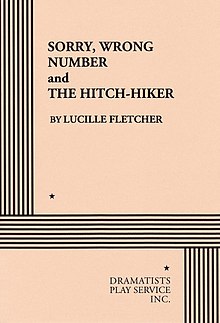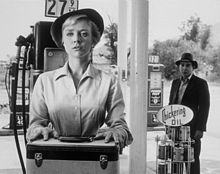The Hitch-Hiker (radio play)
| The Hitch-Hiker | |
|---|---|
 ISBN 978-0-8222-1059-7 | |
| Written by | Lucille Fletcher |
| Date premiered | November 17, 1941 |
| Place premiered | CBS Radio |
| Original language | English |
| Series | The Orson Welles Show |
| Genre | Drama Ghost story |
The Hitch-Hiker is a radio play written by Lucille Fletcher. It was first presented on the November 17, 1941, broadcast of The Orson Welles Show on CBS Radio, featuring a score written and conducted by Bernard Herrmann, Fletcher's first husband. Welles performed The Hitch-Hiker four times on radio, and the play was adapted for a notable 1960 episode of the television series The Twilight Zone.
Plot[]
The story centers on Ronald Adams, a young man embarking on a cross-country drive from New York to California. Soon after leaving his mother's home in Brooklyn, he sees a hitch-hiker standing in the rain on the Brooklyn Bridge trying in vain to get a lift. Adams takes little notice but is startled an hour later when he sees the same man again along the Pulaski Skyway. Adams sees the same hitch-hiker several more times over the ensuing days. Though the man seems ordinary and non-threatening, Adams cannot understand how he keeps getting ahead along his route and is increasingly alarmed by his repeated appearances.
Adams eventually becomes terrified of the hitch-hiker and does not stop for longer than it takes to refuel his car. By the time he reaches the American Midwest, he has decided to purposely run down the mysterious man when he next sees him. Exhausted and desperate for someone to talk to, Adams picks up another hitch-hiker, a girl who needs a lift to Amarillo, Texas. They make light conversation until Adams sees the hitch-hiker again and almost crashes into a barbed-wire fence in an attempt ram him with his car. Not seeing anyone on the side of the road, the girl and jumps out of Adams' car in terror. She is picked up by a passing truck. A shaken Adams decides to nap on the side of the road. He hears someone call "hall-ooo!" and is horrified to see the hitch-hiker approaching, his raincoat wet even though they are in a dry and dusty prairie. Adams quickly restarts his car and speeds on.
Finally, Adams feels that he is going mad due to fear and lack of sleep. He finds a payphone at a gas station in the middle of the New Mexico desert and calls his mother in Brooklyn, feeling that he can pull himself together if he can hear a familiar voice. The long-distance operator puts his call through, but Adams is confused when the telephone is answered by a woman's voice he does not recognize. She states that Mrs. Adams is in the hospital due to a nervous breakdown brought on by the sudden death of her oldest son Ronald six days before. Stunned, Adams demands an explanation and is told that he died in a car accident on the Brooklyn Bridge, which is where and when he had first seen the hitch-hiker. Adams is too shocked to reply, and the call drops when his paid-for long-distance time expires.
The radio play ends with Adams expressing his determination to find the hitch-hiker again: "Somewhere I will know who he is - and who I am."
Background[]

Immediately after their marriage in October 1939, Lucille Fletcher and Bernard Herrmann left New York for Hollywood, where Herrmann was to begin work on the score of Orson Welles's first feature film, Citizen Kane. They traveled cross-country several times by air and by train; but their most memorable trip was made in 1940, with Herrmann driving their Packard convertible. Fletcher saw "an odd-looking man, first on the Brooklyn Bridge and then on the Pulaski Skyway. We never saw him again. However, I didn't quite know what to do with the idea until a year later, when … I conceived the idea of doing it as a ghost story."[1]
"The Hitch-Hiker was written for Orson Welles in the days when he was one of the master producers and actors in radio," Fletcher wrote in her preface to the published version of the radio play, which adapts it for the stage. "It was designed to provide a vehicle not only for his famous voice but for the original techniques of sound which became associated with his radio presentations. … Orson Welles and his group of Mercury Players made of this script a haunting study of the supernatural, which can still raise hackles along my own spine."[2]
The music for The Hitch-Hiker — called "one of Herrmann's most chilling scores" by biographer Steven C. Smith[3] — was used in all four radio presentations. It was also re-recorded as stock music that can be heard (usually uncredited) on the soundtracks of several CBS television series, including the 1960 Twilight Zone adaptation of The Hitch-Hiker.[4] Herrmann's score (CBS Music Library VIII 56-D-1) is in the UCLA Music Library Special Collections.[5]
"We really shared that story together," Fletcher said in a 1988 interview about Bernard Herrmann. "He was very interested in that story so he had to write the music for it."[6]
Presentations[]
The Hitch-Hiker was first performed by Orson Welles on the November 17, 1941, broadcast of The Orson Welles Show on CBS Radio.[7] Welles also performed the radio play on Suspense (September 2, 1942), The Philip Morris Playhouse (October 16, 1942),[8] and The Mercury Summer Theatre of the Air (June 21, 1946).[9]
Adaptations[]

Rod Serling adapted The Hitch-Hiker for the first season of his television anthology series The Twilight Zone. Broadcast January 22, 1960, Serling's version makes notable changes to the story, most notably changing the gender of the driver to a female named Nan Adams (named for one of Serling's daughters), portrayed by Inger Stevens.[10][11] When the teleplay was adapted for radio on The Twilight Zone Radio Dramas in 2002, the role of Nan Adams was played by Kate Jackson.[citation needed]
In 2004, Mind City Productions adapted the Mercury Theater version of the radio play into an animated short film, adding animation directed by Michael Anthony Jackson to the original recording of the Mercury radio production. This was intended to be the first in a series of animated adaptations of Mercury radio productions, although to date, this remains the only entry in the series.[12]
In 2011, a short film adaptation of "Hitchhiker" was produced and directed by Lawrence Anthony.[13]
In 2020, a fragment of Welles’ radio broadcast was sampled by Hip-Hop and R&B artist Logic to be part of the first track of his studio album, No Pressure.
References[]
- ^ Smith, Steven C., A Heart at Fire's Center: The Life and Music of Bernard Herrmann. Berkeley and Los Angeles, California: University of California Press, 1991, hardcover; 2002, paperback ISBN 978-0-520-22939-6 page 72
- ^ Fletcher, Lucille, Sorry, Wrong Number and The Hitch-Hiker. New York: Dramatists Play Service, Inc., 1952 (revised), 1980 (renewed), ISBN 978-0-8222-1059-7 pp. 23 and 25
- ^ Smith, Steven C., A Heart at Fire's Center: The Life and Music of Bernard Herrmann. Berkeley and Los Angeles, California: University of California Press, 2002, paperback ISBN 978-0-520-22939-6 page 72
- ^ Film Score Rundowns, "The Hitch-Hiker (Bernard Herrmann)"; retrieved July 1, 2012
- ^ Wrobel, Bill, Film Score Rundowns, "CBS Collection 072 UCLA," Blog 42, June 25, 2010. Herrmann's score for The Hitch-Hiker is in Box 11 (page 23).
- ^ Interview, Lucille Fletcher on The Hitch-Hiker. Bernard Herrmann: A Celebration of his Life and Music (1988), a radio documentary by Bruce Crawford and Bob Coate, KIOS-FM, part one; retrieved July 1, 2012
- ^ Welles, Orson, and Peter Bogdanovich, This is Orson Welles. New York: HarperCollins Publishers 1992 ISBN 0-06-016616-9 Chronology of Welles's career by editor Jonathan Rosenbaum, page 367
- ^ The Definitive Philip Morris Playhouse Radio Log, retrieved January 21, 2012
- ^ Welles, Orson, and Peter Bogdanovich, This is Orson Welles, chronology of Welles's career by Jonathan Rosenbaum, pp. 372, 373
- ^ DeVoe, Bill. (2008). Trivia from The Twilight Zone. Albany, GA: Bear Manor Media. ISBN 978-1-59393-136-0
- ^ Grams, Martin. (2008). The Twilight Zone: Unlocking the Door to a Television Classic. Churchville, MD: OTR Publishing. ISBN 978-0-9703310-9-0
- ^ Jackson, Michael Anthony. (2004). The Hitchhiker. Mind City Productions.
- ^ "Twilight Zone: Hitchhiker". "iMaiden Channel".
External links[]
- The Hitch-Hiker — Suspense at the Internet Archive (September 2, 1942)
- The Hitch-Hiker — The Mercury Theatre on the Air at the Internet Archive (June 21, 1946)
- Herrmann Photo Tour including a photo of the title page of the score for The Hitch-Hiker (CBS Collection, UCLA). The Bernard Herrmann Papers, The Bernard Herrmann Society; retrieved June 24, 2012
- "The Hitch-Hiker" at IMDb (The Twilight Zone, January 22, 1960)
- The Hitch-Hiker at IMDb (2004)
- American radio dramas
- CBS Radio programs
- 1940s American radio programs
- Orson Welles
- Ghosts in written fiction
- Hitchhiking in fiction